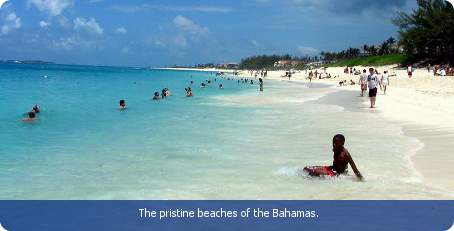Find a business in Bahamas, The

The Bahamas is a coral archipelago of around 700 islands. Its tourism and financial sectors have made the country one of the wealthiest in the Caribbean. A GNI per capita of US$20,600 (2012) puts it in the top 50 richest countries in the world, although recent growth has been stunted due to a global downturn in 2008-09 and a subsequent fall in tourism to the islands. The Bahamas is a developing country and its economy is dominated by the two sectors of tourism and financial services.
Tourism accounts directly or indirectly for at least 50 per cent of the country’s GDP and employs almost 50 per cent of the island’s labour force, either directly or indirectly (World Travel and Tourism Council, 2011). The country’s natural beauty, climate and beaches, allied to its close proximity to the United States and attractiveness to foreign investors, has enabled The Bahamas to build up a significant tourism infrastructure. Steady growth in tourism receipts and a boom in construction of new hotels, resorts and residences have contributed to GDP growth, which nevertheless lags at -0.4 per cent (2008-12).
With the attainment of independence from Britain in 1973 The Bahamas set itself up as an off-shore banking haven and financial services centre. This, combined with little or no individual or corporate income tax, made the island an attractive destination for foreign capital and has made The Bahamas one of the region’s most successful economies. In terms of development, size and market share, The Bahamas is generally regarded as one of the world’s leading centres for offshore banking. There are between 300 to 400 registered offshore banks and trusts on the islands.
The Bahamas is a net importer of goods and services. Its net imports accounted for 14 per cent of GDP in 2004. The Bahamas is not known for high taxes, however, the government raises a substantial portion of its finances from import tariffs. The average ad valorem tariff for imported goods is 30 per cent. The main exports are minerals – including salt – animal products, rum, chemicals, fruit and vegetables; the main imports are industrial equipment, manufactures, chemicals, fuels and food.
Since 1717 there has been virtually no tax on individuals or companies. But despite concerted efforts to diversify its economy by the government, at present business in The Bahamas is heavily reliant on the state of the US economy because 80 per cent of its tourists come from that country.
The Bahamas is ranked 13th among Latin American and Caribbean countries in the World Bank’s ‘Doing Business 2012’ study.




